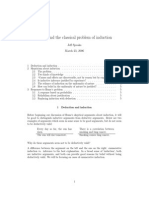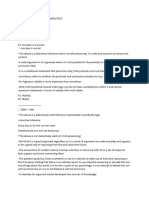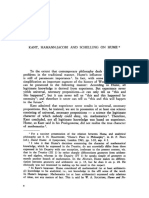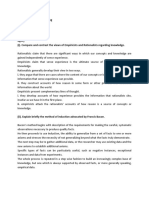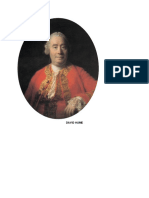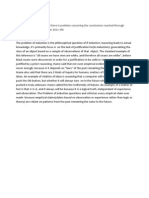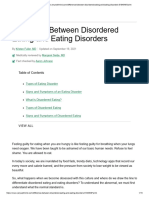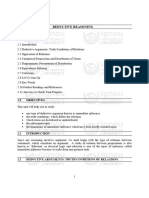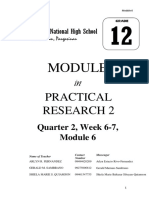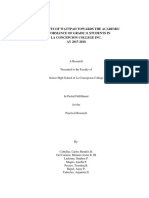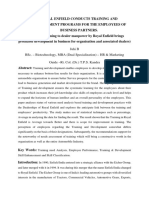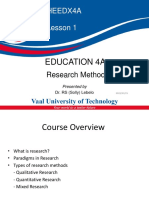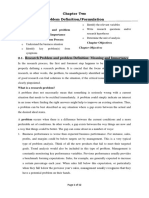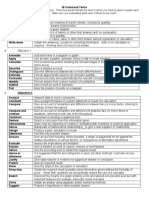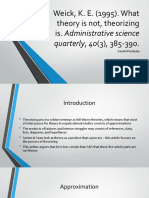UNIT 4 INDUCTION
Contents
4.0 Objectives
4.1 Introduction
4.2 Kant’s Problem
4.3 Hume’s Attack on Science vis-a-vis Induction
4.4 In Defense of Induction
4.5 Against Induction
4.6 Function of Falsification
4.7 Let Us Sum Up
4.8 Key Words
4.9 Further Readings and References
4.10 Answers to Check Your Progress
4.0 OBJECTIVES
This unit brings to you a major philosophical issue which has run through ages; i.e., the problem
of induction. A brief reference is made to all players who have contributed to the wealth of this
issue. While Hume, Kant and Mill represent previous generation; Russell, Max Black and
Popper represent the present generation. The link between induction and causation is shown in
Mill’s rejoinder to Hume. At the end, you should be in a position to appreciate Hume’s
arguments focusing on the perplexities of science and scientific method.
4.1 INTRODUCTION
Though Locke asserted that in the strict sense of the term, knowledge of natural laws is not
possible, it was David Hume who discovered inherent problems in the structure of natural laws,
which in other words, is known as empirical knowledge and method purported to be the method
of science. It is desirable to note that these philosophers developed the criteria of empirical
knowledge in opposition to the rationalistic conception of knowledge, which in course of time
revolutionized our conception of science and scientific method.
But what is this so-called problem of empirical knowledge and what has this got to do with the
problem of induction about which nothing is said at present? It is good to begin with Hume’s
fork. Hume says in his celebrated work, ‘Enquiry concerning human understanding’ that ‘All
objects of human reason or enquiry (knowledge) may naturally be divided into two kinds,
‘relations of ideas and matters of fact’. Hume conceded that the former kind is conclusively or
demonstratively certain and hence can be denied only at the peril of self-contradiction. The so-
called natural laws provide knowledge of matters of fact. Hence as things stand, this kind of
knowledge is not certain, but can it somehow be made certain? This was Hume’s problem. In
other words, Hume gave a new twist to the problems which we face in our study of philosophy
of science. His sole concern was to search a solution for the burning question - is scence a
1
�rational enterprise or just irrational, as irrational as a poet’s imagination or hallucinations of a
lunatic?
Though Hume never mentioned the problem of induction directly, his preoccupation with the
problem of causation, which will be discussed later, has provided enough material to turn the
heat on the supremacy of science through the problem of induction. In Hume’s own words the
problem of induction is “Are we justified in reasoning from (repeated) instances of which we
have experience to other instances (conclusions) of which we have no experience?”
When Hume raised this question, little did he realize that he was opening the Pandora’s Box.
Since then a lot has been said on this problem. Subsequent discussion has not only resulted in
diverse literature, but also it has given new dimensions, perhaps unforeseen by Hume himself, to
the problem. So we consider Hume’s problem ‘classical’ or ‘traditional’, problem of induction
to differentiate it from the later aspects of the problem.
Now, how does induction proceed or what is inductive method? As distinct from the deductive
arguments, whose premises imply their conclusion, the premises of inductive arguments are
merely supporting their conclusions; in other words, the conclusions of inductive arguments are
probable, not necessary as in deductive argumentation. It is because inductive arguments
proceed from particular instances to general propositions. In fact, deductive arguments get the
general propositions through the inductive reasoning! For example, all humans are mortal, Ashok
is human, therefore, Ashok is mortal, is a deductive argument; now, how is its first premise, ‘all
humans are mortal’ derived? Certain kind of generalization is in the reasoning. The problem of
induction consists in seeking out the possibility of deriving general principles from experiences.
Now this procedure is questioned in the history from different corners.
4.2 KANT’S PROBLEM
In Unit 2 of block II, we discussed two sources of knowledge. The present discussion is an
extension of previous discussion and both spring from Hume’s fork. Kant, very soon, caught up
with Hume’s problem. In his own words, Hume woke him up from ‘dogmatic slumber’. He
adopted an ingenious method to get over the problem raised by Hume and hence save science
from the ignominy of being irrational. The essence of the method is as follows. All analytic
propositions without exception are a priori. Further, synthetic propositions are a posteriori. But
the question is whether all synthetic propositions are a posteriori, or at least some are a priori.
Kant answered the latter part of the question in affirmative. He was convinced that there are
synthetic a priori propositions in mathematics. His only question was whether synthetic a priori
propositions are possible in metaphysics too. He wrote ‘The Critique of Pure Reason’ with the
intention of proving the possibility of synthetic a priori propositions in metaphysics. If he had
succeeded in proving so, then he would have answered Hume effectively. One proposition
which Kant wanted to show that it is synthetic a priori, is one connected to causation. History
has recorded that Kant did not succeeded in his mission.
Kant’s concern for synthetic a priori propositions, was, somehow, relegated to background in
Germany. Instead, it gave birth to German idealism in Hegel. It was Mill who picked up the
thread from where Kant had dropped. He, therefore, tried to answer Hume directly. Whatever
2
�development that took place in the problem of induction in the twentieth century has its origin in
these three philosophers.
4.3 HUME’S ATTACK ON SCIENCE, VIS-A-VIS, INDUCTION
Broadly speaking, the problem of induction has divided philosophers into two camps;
inductivists and non- inductivists or deductivists. Obviously, this is not exhaustive. In between
we find sceptics and Hume in virtue of his mitigated scepticism heads this group. Even among
inductivists who try to justify induction there is no unanimity. Among non- inductivists this
problem does not arise because they simply refuse to accept induction as a form of logic.
The problem of induction deserves to be studied in all its complexity. Since whatever developed
subsequent to Hume’s arguments amounts to either partial acceptance of Hume’s position or
modifications of Hume’s thesis, it is inevitable to begin with Hume’s analysis of the problem.
Hume took up seriously problems posed by ampliative induction which consists in arguing from
‘observed to unobserved or from ‘observed to unobservable’. For example, consider this
argument.
Premise: For the past one month I have observed without fail that the bus which I take to go to
the college arrives exactly at 8.30 A.M.
Conclusion: Therefore I conclude that on all days the bus arrives exactly at 8.30 A.M.
Hume’s analysis reveals that there is no justification to argue from the past experience of the
events of which we have positive information to the future events of which we have no
experience whatsoever. The argument cited above is an example of induction which was
criticized by Hume for its incompetence to stand the test of reason. But it is also a fact that given
normal intelligence, every man in his senses argues and concludes on the basis of experience
only. Experience may be his own or that of some other dependable person. Philosophy cannot
afford to neglect such men. Hume says, therefore, that though there cannot be any logical
justification for such a leap, it is possible to explain on practical grounds why men behave in
such a manner. The repetition of events in a certain uniform manner induces men to react in the
said manner. In Hume’s own words, it is just a ‘mental habit’ or mere ‘animal instinct’ which is
behind the scene. Custom is always devoid of reason and what Hume is exploring, are nothing
but the principles of empirical sciences. To say that induction has its roots in custom is
tantamount to saying that the methods adopted by the empirical sciences have their roots in
custom. The upshot of Hume’s thesis is that the irrationality of custom renders the whole of
empirical science, which includes the much pampered experimental science, irrational, a pathetic
conclusion indeed.
A little digression: When the problem of induction is treated as the problem of the methods of
empirical sciences, there is no reason why the problem should not be considered the one
belonging to the ‘philosophy of science’. Since a discussion of the problem of induction is also a
discussion of the methods of empirical sciences, such a study is the study of the ‘methodology’
of science or simply metascience, which also includes a discussion of the nature of laws and
theories in science.
3
�We shall put ourselves back on the track. Hume’s argument has come in for many sharp
criticisms. Obviously, for many, it is unpalatable to consider empirical sciences irrational; thanks
to the sort of education they have received. Bertrand Russell, in no uncertain terms has exposed
the situation in his work History of Western Philosophy. If ‘the bankruptcy of eighteenth century
reasonableness’ is not countered effectively, then, ‘every attempt to arrive at general scientific
laws from singular observations is fallacious’. The question is how to redeem science from its
impending grave. Thus we see that the problem of induction at once is transformed into a crucial
problem of survival for science.
When Hume said that there can be no ‘justification’ for induction, what did he mean by the word
justification? Justification, in general, means satisfactory explanation. But Hume thought much
more. He demanded that the explanation should be conclusive, or to put it in Hume’s words, it
should be ‘intuitive or demonstrative’.
Barring Bertrand Russell, all other inductivists question the propriety of using reason the way
Hume used. It is obvious that by adopting this function of reason as the criterion, Hume expected
inductive inference to function as deductive inference. Possibly, it is only Russell who used the
word reason in the sense in which Hume used. On the other hand, both Salmon and Urmson
attribute Hume’s failure to accept justification of induction to his reluctance or inability to
distinguish inductive function from deductive function. Hume’s attempt is somewhat analogous
to an umpire judging cricket by applying the rules of hockey. It can be said, therefore, that Hume
attempted an impossible task of deriving the synthetic proposition from an analytic proposition,
or a posteriori from a priori.
There is another point in Hume’s arguments which deserves to be mentioned. The problem of
justification, which Hume raises, is purely a logical problem. But the answer provided by him to
this question is psychological and hence the problem itself loses its logical character. Popper
attempts at the elimination of this factor. We shall postpone our discussion of Popper’s account
to the next section.
Hume completes his analysis of the problem by pointing out that even probability of an inductive
argument cannot be established beyond doubt. In other words, not only our ‘expectation’ of the
‘definite’ occurrence of an event, but also our expectation of the ‘probable’ occurrence of an
event has its roots in belief or custom. Therefore empirical knowledge can never free itself from
custom. Therefore it is possible to conclude that the question raised by Hume is not a genuine
question at all. Therefore various attempts have been made to justify induction on some other
grounds. Once the grounds change, the formation of the problem also changes. The natural way
to begin the investigation is by comparing inductive reasoning with deductive reasoning. How
can we determine the validity of a deductive argument? Obviously, one way is through appeal to
the deductive rules. If deductive rules help us to accept one argument and reject some other
argument, then inductive rules, when precisely formulated, may help us to accept one inductive
argument at the cost of some other argument. To consider the same analogy, if we can play
hockey by following the rules of that game, we can as well play cricket by following the rules of
that game and if there are no rules let us evolve them. Can we succeed in our mission?
4.4 IN DEFENSE OF INDUCTION
4
�In his celebrated work, The Problems of Philosophy, Russell makes a distinction between two
kinds of principles, which may be used to justify induction; empirical principle and non-
empirical principle. According to him, an empirical justification of induction by appealing to
facts is as good as an inductive justification of induction. Obviously, such a justification
becomes circular. For example, in order to prove that all crows are black we cannot point to an
observed sample and then proceed to unobserved because in such a case what is to be proved
becomes the premise and the argument becomes circular. Accordingly, he formulated two
principles of induction which are supposed to be non-empirical.
The greater the number of cases in which a thing of the sort A has been found associated with a
thing of the sort B, the more probable it is (if no cases of failure of association are known) that A
is always associated with B.
Under the same circumstances, a sufficient number of cases of the association of A with B will
make it nearly certain that A is always associated with B.
Apparently, the word ‘probable’ or ‘nearly certain’ makes these principles non-empirical. But
Russell’s approach poses some problems. If Russell actually meant that a non-empirical
principle should be adopted, then it necessarily means that induction has to be justified by
invoking a non-inductive (non-empirical) principle. Hence, whatever charges are directed against
Hume also can be directed against Russell. Secondly, Russell says that ‘we want also to know
that there is probability…… that things of the sort A are ‘always’ B. Probability of A ‘always’
becoming B does not seem to make sense. Suppose, for example, that there are only twenty
swans in the world and I have seen fifteen swans, which are white. Now the chances or
probability of any unobserved swan being white is 15/20 or 3/4. Russell’s rule, now, is
tantamount to saying that the probability of every unobserved swan being white is always 3/4.
This is absurd. The very word probability should exclude ‘always’. Russell’s use of ‘probable’
indicates that it is the predicate of the event or object in question. But probability is only the
relation between the premises and the conclusion. Thirdly, it is not necessary that all observed A
should be B. Suppose that out of six observed swans 4 are white. Then the probability of any
unobserved swan being white is 2/3. In other words, the probability of a general principle being
true is 3/4, or 2/3, as the case may be.
However, according to a certain standpoint, the inclusion of the word probability saves inductive
reasoning from one more crisis. It is said that to argue from ‘all observed A are B’ to the
conclusion ‘all A are B’ amounts to formal invalidity because ‘all observed A’ do not equal ‘all
A’, but less than that. In other words, the fallacy is similar to the one, which arises due to the
violation of distribution rule. But if we say that ‘all A are probably B’, we are avoiding this
fallacy.
But this argument is another instance, which illustrates the euphoria of deductive test. The very
word formal invalidity, or validity, or reference to distribution rule shows either the supremacy
of deductive test or the inability of the logicians to recognize that deductive reasoning is different
from inductive reasoning. It seems, even Stebbing is unable (or may be reluctant) to recognize
the difference.
5
�The problem of induction was tackled by two groups of the sympathizers of induction on
different lines. The analytic philosophers considered the problem itself a pseudo-problem. Paul
Edwards and Urmson, for example, believed that the problem stands in need of reformulation.
While Edwards was concerned with the analysis of the meaning of ‘reason’, Urmson thought that
the traditional way of asking the question itself was wrong. According to Urmson, the transition
from the question ‘are any inductive arguments valid’ to the question ‘what good reasons can be
given for rating arguments of a certain type higher than arguments of another type’ is itself a real
advance. But in his formulation there is a problem. When we raise the latter question, we
presuppose that there is an argument, which is higher than the other, and then we search for the
reasons, and hence the fallacy of complex question. Suppose that A and B are two arguments.
How are we to know which is superior and which is inferior? We shall consider Urmson’s
analogy itself. How do we know the standards of a good apple? The answer is obvious; by
considering taste, etc. But how do we know that a good apple should have a particular taste,
should be free from wormholes, etc.? Obviously, mere reasoning about apple does not help. But
experience is the guide. Either I should have tasted both the kinds of apple earlier, or I should
have been told by someone. Urmson’s formulation of the question includes neither of the
alternatives.
Max Black is another philosopher whose account we shall consider now. He argues that support
for inductive inference can be discovered within induction itself, but he contends that there will
be no circularity contrary to the generally accepted view. To justify his stand, Max Black
considers two orders of inference. He calls the inductive inference governed by an inductive rule
a second order inference. Following his line of argument, we can call the inductive rule itself the
first order inference. He affirms that as long as the first order inference differs from the second
order inference there is no circularity. But how do we account for the difference? Again, the
level of probability accounts for the difference. The inductive rule formulated by Max Black is as
follows:
Rule: To argue from ‘Most instances of A’s examined in a wide variety of conditions have been
B to (probably) the next A to be encountered will be B’.
It is sufficient if we note that in spite of Max Black’s account of the difference between first
order and second order inferences, Salmon and others contend that circularity is not avoided.
A common feature of this approach is to regard traditional formulation of the problem as
defective because it arises due to conceptual or linguistic confusion and hence it is not a genuine
problem. The concept here involved is ‘justification’ and consequently, reason. Paul Edwards is
more critical about the word reason. In fact, his criticism of Russell’s account is based on the
meaning attributed by Russell to ‘reason’. What has happened is that both Hume and Russell use
the word ‘reason’ in a very different sense, different from common sense usage. This is the root
of all problems. In common sense usage reason is mere ground for acceptance. For Hume and
Russell reason is similar to logical proof.
In opposition to this approach, Salmon and Reichenbach developed the justification of induction
on pragmatic lines. Salmon contends that the analytic approach to dissolve the problem is not a
very satisfactory one. Here it is not the problem of justification, which matters, but the problem
6
�of inductive evidence matters. Whether or not the premises of an argument support the
conclusion is based on whether the rule or rules governing the argument are correct or not. When
there are several rules, either we should prove them or search some other means to choose the
rules. The former is ruled out; hence only the latter remains. They adopt pragmatic standard to
choose the best inductive rule from among many rules. This is a special form of justification,
viz., vindication. Vindication is possible, when the rule achieves the purpose, which it is
supposed to achieve.
After examining a few rules, both of them show that the rule of induction by enumeration is the
most suited or the best possible rule. It is so because induction by enumeration (according to
them) is functionally superior to any other rule. Now the shift from Hume is clear. The problem
no longer is whether from the given true premises a true conclusion can be discovered in
induction, but the problem is how to find out the best possible rule, and Salmon and others
claimed to have achieved this and hence the solution to Hume’s problem in its refined form. It
may be noted that Russell also, in spite of his close affinity to Hume, tends towards pragmatic
justification. The choice of a rule is similar to the choice of a theory. For example, we prefer
Einstein’s theory of gravitation to Newton’s theory of gravitation because the scientific purposes
are served better by the former. Such choice becomes a choice of community – the community of
philosophers.
Since probability is at the root of all these discussions, something more remains to be said about
it. Suppose that ‘n’ is the total number of events or objects in the class of ‘A’, and m is the
number of observed events in the class. Probability, then, cannot be satisfactorily determined if n
tends to infinity because in such a case the probability of the said event is nearly zero. J.M.
Keynes, for example, asserts that a successful application of probability is possible only if we
make certain presuppositions regarding the structure of the existent world. He considers two such
principles, ‘the Principle of Limited Independent Variety’ and ‘the Principle of Atomic
Uniformity’. According to the former, a limited number of objects with their finite number of
qualities determine whatever variety we find in the given field. A very good example of this
principle is the capacity of carbon to form as many as millions of compounds, and another is
emphasis on the unified field theory. Even though we may not study all compounds of carbon, it
is possible to assert a good deal about them with the help of our knowledge of carbon and other
elements.The second principle only means that all macroscopic changes are the combinations of
microscopic changes. Keynes admits that these principles are not logically necessary and hence
he falls back on pragmatic considerations because they serve as the working principles in the
field of science.
4.5 AGAINST INDUCTION
So far, we considered attempts to justify induction by its sympathizers. However, the most
influential and at the same time devastating work on this problem is done by Popper. He takes a
clear anti-inductivist stand. His attack on induction as a method of science begins with his
analysis of Hume’s problem. In one of his works, ‘Objective Knowledge’, he attempts to replace
all terms with psychological or subjective import in Hume’s question regarding the justification
of induction, by the so-called objective terms. For example, belief or reasoning is replaced by
‘explanatory theory’: instead of experience he uses the word basic or test statement. By effecting
7
�such changes, Popper believes that the possible danger of science being crippled by irrationalism
can be averted.
Elimination of psychological terms is only the first step in this direction. In order to achieve total
denial of induction, he denies induction by simple enumeration or repetition on the ground that it
leads to infinite regress. Since we appeal to experience to justify induction, we have to recede
from one event to another event without an end. We recede in the sense that we go back to the
past instances one behind the other to justify the future. This regression never has an end. This is
the second step. Thirdly, Popper rejects all possible rules of induction. In Objective Knowledge
Popper considers the pragmatic justification of induction.
Upon which theory should we rely for practical action, from a rational point of view?
To replace this question Popper proposes an alternate question.
Which theory should we prefer for practical action, from a rational point of view?
Popper’s contention is that in the second sense, i.e., for ‘preference’ no justification is needed.
Hence we need not formulate any rule. If we consider an inductive rule in the first sense, it will
be just false. Lastly, following Hume’s line, Popper rejects the probability theory of induction
and, instead, he uses corroboration as the principle. In simple language corroboration means
support. Individual events can only support a theory but cannot prove the same.
Popper considers the problem of induction identical with the problem of demarcation. An
important task of metascience is to draw a precise line of demarcation between science and
metaphysics. Some analytic philosophers argue that all statements of empirical science, in
opposition to metaphysical statements, should be capable of conclusive verification. Popper
argues that neither induction nor conclusive verification provides a satisfactory line of
demarcation. Hence, he evolved, following the lines of Whewell, another criterion of
demarcation, viz., falsifiability. According to this criterion, a statement is empirical, if and only
if it is capable of being falsified. He illustrates by considering the statement ‘either it rains or it
will not rain’ and says it cannot be shown to be false and hence is not empirical.
4.6 FUNCTION OF FALSIFICATION
Popper claims that falsification is non-inductive in the sense that falsification is possible by
adopting other method than induction, which he calls hypothetico-deductive method. This
method consists in accepting tentatively a theory, i.e., a hypothesis, and then deducing logically
conclusion from it. Repeated observations and experiments may confirm or falsify the theory. If
confirmed, it is only temporary and falsification in future is not ruled out. If falsified, then it is
final. When one hypothesis (conjecture) is falsified, we try another hypothesis. If this hypothesis
should stand the test, it should succeed not only where the former has succeeded, but also should
succeed, where the former has failed. However, Popper maintains that the emphasis should be on
the attempt to falsify and not to verify. So it is imperative that we should invent the severest
possible tests to falsify the hypothesis. Suppose that the hypothesis defeats all our genuine
attempts to falsify. Only then it can be accepted. Then it is said to be corroborated. This is what
Popper calls hypothetico-deductive method or simply deductivism, or trial and error method.
8
�There is an important point to be noted. The traditional account of science states that the
scientific approach to the problem begins with observation. Unless the events are observed the
hypothesis cannot be formulated. But in Popper’s analysis observation is not the source of
hypothesis, but the means of testing and falsifying a hypothesis. In this manner Popper shifted
the function of observation.
Corroboration is a technical term adopted in place of probability. The degree of corroboration is
a function of the severity of the tests. At this stage, Popper links corroborability and
improbability. If the content of a statement is minimal, then the statement is highly probable.
Hence, falsification of such a statement is very difficult. For example, the statement, ‘It will rain
one day or the other at least in some corner of the earth’, is certainly very highly probable. But
the content is minimal. Hence not only falsification, but also corroborability is minimal. On the
contrary, if the statement is dense, i.e., possesses maximum content, then it is highly improbable
and in virtue of its very high improbability, it is capable of falsification and hence corroborable.
Hence Popper adopts an extraordinary stand of preferring improbability, to probability.
Significantly, the possibility of corroborability hinges on what is improbable becoming real.
Falsification is regarded by Popper as the criterion of empiricism also.
Popper does not distinguish between a theory and a hypothesis. All theories are conjectural, and
not all of them can survive. Popper endorses Darwinian theory. The fittest theory is that which
has, so far, withstood the tests. Only that theory survives and other theories are rejected resulting
in their extinction and hence he considers his method evolutionary.
We shall conclude by referring to Kant’s problem again, viz., how are synthetic a priori
judgments possible in metaphysics? Kant said that these judgments are imposed on nature by the
knowing mind. But without stopping there he further argues that precisely due to their origin in
the functions of our mental faculties that these judgments are absolutely certain. So it is obvious
that the very nature of Kant’s a priori is functional. Popper’s view is that the synthetic a priori
judgments are ‘genetically a priori but not valid a priori’.
Check Your Progress
Note: a) Use the space provided for your answer.
b) Check your answers with those provided at the end of the unit.
Bring out Hume’s observations on induction.
------------------------------------------------------------------------------------------
Examine various attempts to justify induction.
-------------------------------------------------------------------------------------------
Examine Poppers objections to regard induction as a method of Science.
----------------------------------------------------------------------------------------------
4.7 LET US SUM UP
9
�Hume raises objections to one form of induction known as ampliative induction. The objections
to generalization are formulated on one ground; no proof in strict mathematical or deductive
sense is possible when we deal with induction. Inductive inference can only be vindicated
because any attempt to justify the same runs into infinite regress or becomes circular.
Generalization can only be disproved or falsified though it cannot be proved. Salmon, Max Black
and Urmson defend induction whereas Russell and Popper reject induction. Popper’s theory is
known as anti-inductivism or non-inductivism. Popper replaces verifiability by falsifiability.
4.8 KEY WORDS
Hypothesis: A hypothesis consists either of a suggested explanation for an observable
phenomenon or of a reasoned proposal predicting a possible causal correlation among multiple
phenomena. The term derives from the Greek, hypotithenai meaning “to put under” or “to
suppose.”
Probability is a technical term used extensively in all sciences which use quantitative analysis.
It, generally, is used to deal with projection which is future-oriented or past-oriented. It is always
expressed in proper fraction where the denominator points to the total number of possibilities and
numerator points to the issue at stake.
4.9 FURTHER READINGS AND REFERENCES
Copi, I.M. Introduction to Logic. New Delhi: Prentice Hall India, 1995.
Holland, John H., et al. Induction: Processes of Inference, Learning, and Discovery. Cambridge:
The MIT Press, 1989.
Holyoak, Keith and Morrison, Robert. The Cambridge Handbook of Thinking and Reasoning.
New York: Cambridge University Press, 2005.
Mill, John Stuart. A System of Logic. Honolulu: University Press of the Pacific, 2002
Popper, Karl. The Logic of Scientific Discovery. London: Routledge, 1959.
Russel, Bertrand. The Problems of Philosophy. London: Williams and Norgate, 1912.
-------------. History of Western Philosophy.New York: Simon and Schuster, 1946.
Stebbing,Susan. A Modern Introduction to Logic. London: 1933.
4.10 ANSWERS TO CHECK YOUR PRGRESSS
Hume argues that there is no justification to argue from the past experience of the events of
which we have positive information to the future events of which we have no experience
whatsoever. But it is a fact that given the normal intelligence, every man in his senses argues
and concludes on the basis of his experience. Philosophy cannot afford to neglect such men.
Hume says, therefore, that though there cannot be any justification for such a leap, it is possible
to explain why men behave in such manner. The repetition of events in a certain uniform
manner induces men to react in the said manner. In Hume’s own words, it is just a ‘mental
habit’ or mere ‘animal instinct’ which is behind the scene. Custom is always devoid of reason
and what Hume is exploring, are nothing but the principles of empirical sciences. To say that
induction has its roots in custom is tantamount to saying that the methods adopted by the
10
�empirical sciences have their roots in custom. The upshot of Hume’s thesis is that the
irrationality of custom renders the whole of empirical science, which includes the much
pampered experimental science, irrational, a pathetic conclusion indeed.
The problem of induction was tackled by two groups of the sympathizers of induction on
different lines. The analytic philosophers considered the problem itself a pseudo problem. Paul
Edwards and Urmson, for example, believed that the problem stands in need of reformulation.
While Edwards was concerned with the analysis of the meaning of ‘reason’, Urmson thought that
the traditional way of asking the question itself was wrong. According to Urmson, the
transitions from the question ‘are any inductive arguments valid’ to the question ‘what good
reasons can be given for rating arguments of a certain type higher than arguments of another
type’ is itself a real advance. But in his formulation there is a problem. When we raise the latter
question, we presuppose that there is an argument, which is higher than the other, and then we
search for the reasons, and hence the fallacy of complex question. Suppose that A and B are two
arguments. How are we to know which is superior and which is inferior? We shall consider
Urmson’s analogy itself. How do we know the standards of a good apple? The answer is
obvious; by considering taste, etc. But how do we know that a good apple should have a
particular taste, should be free from wormholes, etc.? Obviously, mere reasoning about apple
does not help. But experience is the guide. Either I should have tasted both the kinds of apple
earlier, or I should have been told by someone. Urmson’s formulation of the question includes
neither of the alternatives.
Max Black is another philosopher whose account we shall consider. He argues that support for
inductive inference can be discovered within induction itself, but he contends that there will be
no circularity contrary to the generally accepted view. To justify his stand, Max Black considers
two orders of inference. He calls the inductive inference governed by an inductive rule a second
order inference. Following his line of argument, we can call the inductive rule itself the first
order inference. He affirms that as long as the first order inference differs from the second order
inference there will be no circularity. But how do we account for the difference? Again, the level
of probability accounts for the difference. The inductive rule formulated by Max Black is as
follows:
Rule: To argue from ‘Most instances of A’s examined in a wide variety of conditions have been
B to (probably) the next A to be encountered will be B’.
It is sufficient if we note that in spite of Max Black’s account of the difference between first
order and second order inferences, Salmon and others contend that circularity is not avoided.
A common feature of this approach is to regard traditional formulation of the problem as
defective because it arises due to conceptual or linguistic confusion and hence it is not a genuine
problem. The concept here involved is ‘justification’ and consequently, reason. Paul Edwards is
more critical about the word reason. In fact, his criticism of Russell’s account is based on the
meaning attributed by Russell to ‘reason’. What has happened is that both Hume and Russell use
the word ‘reason’ in a very different sense, different from common sense usage. This is the root
of all problems.
In opposition to this approach, Salmon and Reichenbach developed the justification of induction
on pragmatic lines. Salmon contends that the analytic approach to dissolve the problem is not a
11
�very satisfactory one. Here it is not the problem of justification, which matters, but the problem
of inductive evidence. Whether or not the premises of an argument support the conclusion is
based on whether the rule or rules governing the argument are correct or not. When there are
several rules, either we should prove them or search some other means to choose the rules. The
former is ruled out; hence only the latter remains. They adopt pragmatic standard to choose the
best inductive rule from among many rules. This is a special form of justification, viz.,
vindication. Vindication is possible, when the rule achieves the purpose, which it is supposed to
achieve.
After examining a few rules, both of them show that the rule of induction by enumeration is the
most suited or the best possible rule. It is so because induction by enumeration (according to
them) is functionally superior to any other rule. Now the shift from Hume is clear. The problem
no longer is whether from the given true premises a true conclusion can be discovered in
induction, but the problem is how to find out the best possible rule, and Salmon and others
claimed to have achieved this and hence the solution to Hume’s problem in its refined form. It
may be noted that Russell also in spite of his close affinity to Hume, tends towards pragmatic
justification. The choice of a rule is similar to the choice of a theory. For example, we prefer
Einstein’s theory of gravitation to Newton’s theory of gravitation because the scientific purposes
are served better by the former. Such choice becomes a choice of community – the community of
philosophers.
The most influential and at the same time devastating work on induction is done by Popper. He
takes a clear anti-inductivist stand. His attack on induction as a method of science begins with
his analysis of Hume’s problem. In one of his works, ‘Objective Knowledge’, he attempts to
replace all terms with psychological or subjective import in Hume’s question regarding the
justification of induction by the so-called objective terms. For example, belief or reasoning is
replaced by ‘explanatory theory’: instead of experience he uses the word basic or test statement.
By effecting such changes, Popper believes that the possible danger of science being crippled by
irrationalism can be averted.
12






